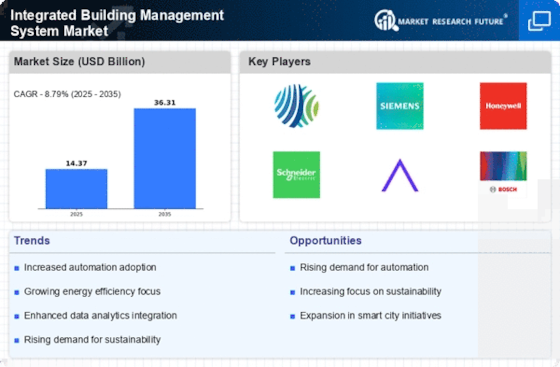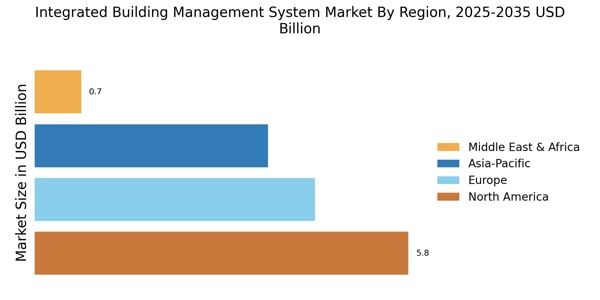Regulatory Compliance and Standards
The Integrated Building Management System Market is significantly influenced by the need for regulatory compliance and adherence to industry standards. Governments and regulatory bodies are increasingly implementing stringent building codes and standards aimed at enhancing safety, energy efficiency, and environmental sustainability. For instance, the implementation of the International Energy Conservation Code (IECC) has prompted building owners to adopt integrated management systems that ensure compliance. This regulatory landscape not only drives the demand for advanced building management solutions but also encourages innovation within the industry. As compliance becomes more complex, the reliance on integrated systems that can streamline reporting and monitoring processes is likely to grow. Therefore, regulatory compliance emerges as a crucial driver in the Integrated Building Management System Market.
Increasing Demand for Energy Efficiency
The Integrated Building Management System Market is experiencing a notable surge in demand for energy-efficient solutions. As energy costs continue to rise, building owners and managers are increasingly seeking systems that optimize energy consumption. This trend is underscored by the fact that energy-efficient buildings can reduce operational costs by up to 30%. Moreover, regulatory frameworks are evolving to promote energy efficiency, further driving the adoption of integrated systems. The integration of advanced technologies, such as IoT and AI, enables real-time monitoring and management of energy usage, which is becoming a critical factor in the decision-making process for facility managers. Consequently, the focus on energy efficiency is likely to remain a pivotal driver in the Integrated Building Management System Market.
Advancements in Technology and Innovation
The Integrated Building Management System Market is significantly shaped by ongoing advancements in technology and innovation. The emergence of cutting-edge technologies, such as artificial intelligence, machine learning, and the Internet of Things, is transforming how buildings are managed. These technologies enable real-time data collection and analysis, facilitating proactive decision-making and enhancing operational efficiency. The market for building automation systems is projected to grow at a compound annual growth rate of 10.5% through 2026, reflecting the increasing adoption of innovative solutions. Furthermore, the integration of these technologies not only improves building performance but also enhances occupant experience and safety. As technological advancements continue to evolve, they are likely to remain a driving force in the Integrated Building Management System Market.
Growing Emphasis on Smart Building Solutions
The Integrated Building Management System Market is witnessing a significant shift towards smart building solutions. This trend is largely fueled by advancements in technology, which allow for the seamless integration of various building systems, including HVAC, lighting, and security. The market for smart building technologies is projected to reach USD 109 billion by 2025, indicating a robust growth trajectory. As organizations strive to enhance operational efficiency and occupant comfort, the demand for integrated systems that facilitate automation and data analytics is increasing. Furthermore, smart buildings are perceived as a means to improve sustainability and reduce carbon footprints, aligning with broader environmental goals. Thus, the growing emphasis on smart solutions is poised to be a key driver in the Integrated Building Management System Market.
Rising Urbanization and Infrastructure Development
The Integrated Building Management System Market is being propelled by the rapid urbanization and infrastructure development occurring in various regions. As urban populations continue to swell, the demand for efficient and sustainable building solutions is escalating. According to recent estimates, urban areas are expected to house nearly 68% of the global population by 2050, necessitating the construction of smart and integrated buildings. This urban expansion creates a pressing need for systems that can manage resources effectively and enhance the quality of life for residents. Consequently, the integration of building management systems is becoming essential in new developments, as they provide the necessary tools to optimize building performance and resource utilization. Thus, rising urbanization serves as a vital driver in the Integrated Building Management System Market.

















